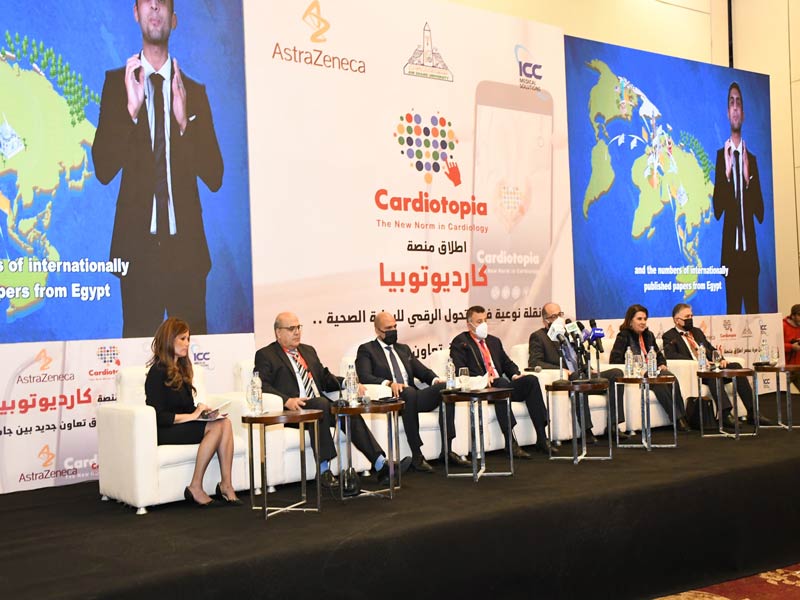Ain Shams University and AstraZeneca celebrate the launch of the Cardiotopia platform for digital transformation in the cardiology departments
As part of the Egyptian state’s endeavors for digital transformation in light of Egypt’s vision 2030, the Cardiology Department at Ain Shams University launched the “Cardiotopia” platform jointly and in cooperation with AstraZeneca International for Pharmaceuticals, as a program for digital transformation of cardiology departments to help doctors and patients at Ain Shams University use modern global technology.
The launching ceremony of the platform was witnessed by Prof. Dr. Mahmoud El-Metini, President of Ain Shams University, Dr. Hatem Al-Wardani, Chairman of the AstraZeneca Board of Directors, Prof. Dr. Ayman Saleh, Vice President of Ain Shams University for Graduate Studies, Prof. Osama Mansour, Vice Dean of the Faculty of Medicine for Graduate Studies and Research, Prof. Shahira Samir Vice Dean of the Faculty of Medicine for Community Service and Environmental Development Affairs, Prof. Dr. Nabil Farag, Head of the Cardiology Department, Ain Shams University, and Dr. Sherif Waguih, Head of the Medical Sector at AstraZeneca.
(Cardiotopia) is a system based on the use of modern technology to support the heart patient by creating an integrated digital database directly that includes all the steps of the patient’s journey from the moment he enters the heart departments at the university and includes the history, clinical examination, laboratory analyzes and radiology, diagnosis, and treatment prescriptions, which It facilitates the follow-up of the patient in the next visits, saves time and increases the accuracy of diagnosis, in order to enable the patient to take advice from various doctors, consultants and professors of the department easily with the click of a button on their mobile device.
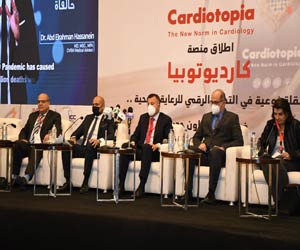 |
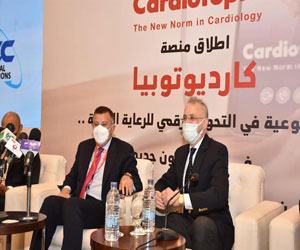 |
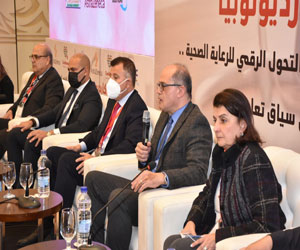 |
||
Prof. Dr. Mahmoud El-Metini said that Ain Shams University was a pioneer in the field of digitization and took giant steps in this field before the Corona pandemic, as a project to automate university hospitals was launched since December 2015, and digital transformation steps began in the rest of the university since 2018.
He added that despite the disadvantages of Covid-19, it had a positive role in accelerating the pace of digital transformation in all fields, especially in the fields of education and health.
Prof. Mahmoud El-Metini explained that he participated today in a meeting with the Ministers of Higher Education and Communications and the coalition companies that will carry out the digital transformation of Egyptian hospitals (digitizing hospitals), where 79 university hospitals will be digitized in addition to some hospitals of the Ministry of Health and Health Insurance.
He stressed that the mechanization of scientific disciplines and various departments has a positive impact on the health care system, in addition to its role in developing medical scientific research in all its general and subtle specialties.
Dr. Mahmoud El-Metini thanked AstraZeneca and the Heart Department for this initiative, which is a step in the path of digital transformation, stressing that the “Cardiotopia” platform will work under the umbrella of the entire system of digital transformation of hospitals.
In his speech, Prof. Dr. Ayman Saleh, Vice President for Postgraduate Studies and Research, said that there is no scientific research without a sound database, pointing out that the digitization of the health system will greatly support scientific research, in addition to its role in improving hospital management and providing better care to the patient, as it has an economic dimension, as a complete file will be available on the patient's condition and the examinations that have been performed, which can be referred to at any time. Therefore, we will only need to repeat the required examinations, which represents a saving of time, effort and money.
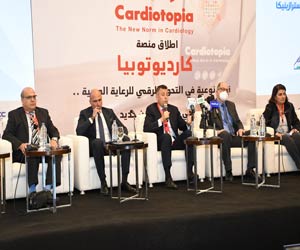 |
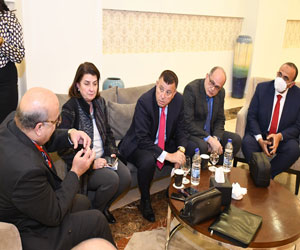 |
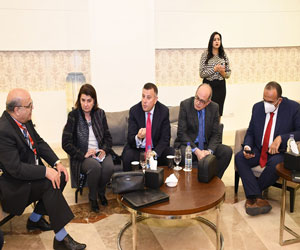 |
||
He added that the launch of the "Cardiotopia" platform is a complement to the hospital digitization system carried out by Ain Shams University, praising AstraZeneca's cooperation with Ain Shams University, which helped accelerate steps that benefit patients, education and scientific research, and is an example of cooperation between civil society and universities.
In his speech, A. Dr.. Osama Mansour, Vice Dean of the College of Medicine for Graduate Studies and Research Affairs, said that the hospital infrastructure has been updated as a first stage to apply digitization and to link university hospitals into an integrated system, noting that the third stage of digital transformation is the integrated entry of patient data.
Prof. Dr. Shahira Samir, Vice Dean of the Faculty of Medicine for Community Service and Environmental Development Affairs, explained that the announcement of the platform coincides with the 42nd annual conference of the Faculty of Medicine at Ain Shams University.
She added that there has been a boom in distance education during the past two years due to the conditions of the Corona pandemic, as well as in telemedicine, to communicate with patients, whether patients with Covid and various diseases, and there has been a digital transformation to digitize all the procedures that take place at the university, there is a digitization system that covers the university and synchronization So with the digitization of hospitals.
Prof. Dr. Shahira Samir praised the step taken by the Cardiology Department, calling for it to be transferred to all departments.
For his part, Prof. Dr. Nabil Farag, Head of the Cardiology Department, thanked the university’s leaders for their support for all development endeavors, and for providing them with an environment conducive to success, pointing out that this major project will make a breakthrough in the form of treatment in the Egyptian health sector, and will contribute to placing the Egyptian medical sector in the ranks of global countries.
He added that one of the medical breakthroughs provided by the Cardiotopia platform is the ability of doctors to enter patients’ medical files on the latest global statistics programs, which will contribute to publishing in the most prestigious international medical journals and raise Egypt’s scientific research standing among the countries of the world. The platform also allows cardiologists to view the catheterization process for the patient on the air is live and their medical opinions are recorded very quickly, which allows doctors to consult their professors and peers in the department as soon as possible to provide the maximum benefit to the patient.
.svg)

